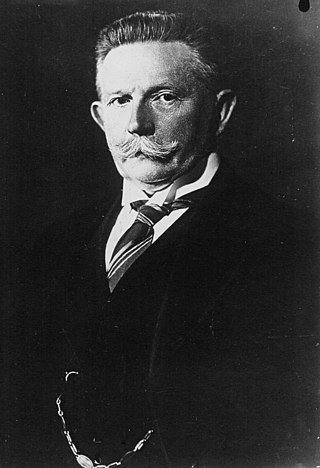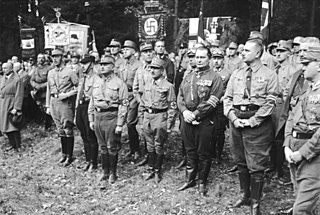Related Research Articles

The German Democratic Party was a liberal political party in the Weimar Republic, considered centrist or centre-left. Along with the right-liberal German People's Party, it represented political liberalism in Germany between 1918 and 1933. It was formed in 1918 from the Progressive People's Party and the liberal wing of the National Liberal Party, both of which had been active in the German Empire.

Alfred Ernst Christian Alexander Hugenberg was an influential German businessman and politician. An important figure in nationalist politics in Germany during the first three decades of the twentieth century, Hugenberg became the country's leading media proprietor during the 1920s. As leader of the German National People's Party, he played a part in helping Adolf Hitler become chancellor of Germany and served in his first cabinet in 1933, hoping to control Hitler and use him as his tool. The plan failed, and by the end of 1933 Hugenberg had been pushed to the sidelines. Although he continued to serve as a guest member of the Reichstag until 1945, he wielded no political influence. Following World War II, he was interned by the British in 1946 and classified as "exonerated" in 1951 after undergoing denazification.

The German National People's Party was a national-conservative and right-wing populist political party in Germany during the Weimar Republic. Before the rise of the Nazi Party, it was the major conservative and nationalist party in Weimar Germany. It was an alliance of German conservative, German nationalist, supporters of the German monarchy, völkisch, and antisemitic elements supported by the Pan-German League. Ideologically, the party was described as subscribing to authoritarian conservatism, German nationalism, and from 1931 onwards also to corporatism in economic policy. It held anti-communist, anti-Catholic, antisemitic, and monarchist views. On the left–right political spectrum, it belonged on the right-wing, and is classified as far-right in its early years and then again from the late 1920s when it moved back rightward.

Karl Joseph Wirth was a German politician of the Catholic Centre Party who served for one year and six months as the chancellor of Germany from 1921 to 1922, as the finance minister from 1920 to 1921, as acting foreign minister of Germany from 1921 to 1922 and again in 1922, as the minister for the Occupied Territories from 1929 to 1930 and as the minister of the Interior from 1930 to 1931. During the postwar era, he participated in the Soviet and East German Communist-controlled neutralist Alliance of Germans party from 1952 until his death in 1956.
In the fourteen years the Weimar Republic was in existence, some forty parties were represented in the Reichstag. This fragmentation of political power was in part due to the use of a peculiar proportional representation electoral system that encouraged regional or small special interest parties and in part due to the many challenges facing the nascent German democracy in this period.
The early timeline of Nazism begins with its origins and continues until Hitler's rise to power.

The Harzburg Front was a short-lived radical right-wing, anti-democratic political alliance in Weimar Germany, formed in 1931 as an attempt to present a unified opposition to the government of Chancellor Heinrich Brüning. It was a coalition of the national conservative German National People's Party (DNVP) under millionaire press-baron Alfred Hugenberg with Adolf Hitler's National Socialist German Workers' Party (NSDAP), the leadership of Der Stahlhelm paramilitary veterans' association, the Agricultural League and the Pan-German League organizations.

Franz Seldte was a German politician who served as the Reich Minister for Labour from 1933 to 1945. Prior to his ministry, Seldte served as the Federal Leader of Der Stahlhelm World War I ex-servicemen's organisation from 1918 to 1934. Ideologically, he identified as a national conservative.
The National Socialist Freedom Movement or National Socialist Freedom Party was a political party in Weimar Germany created in April 1924 during the aftermath of the Beer Hall Putsch. Adolf Hitler and many Nazi leaders were jailed after the failed coup attempt and the Nazi Party was outlawed in what came to be known as the Time of Struggle. The remaining Nazis formed the NSFB as a legal means of carrying on the party and its ideology. Included in this party was the similarly reformed and renamed Frontbann, which was a legal alternative to the SA.
The German Völkisch Freedom Party was an early far-right political party of Weimar Germany that took its name from the Völkisch movement, a right-wing populist and antisemitic movement focused on folklore and the German Volk. Anti-communist, its criticism of capitalism reflected economic antisemitism rather than socialism. The DVFP was founded on 16 December 1922, when Wilhelm Henning, Reinhold Wulle, and Albrecht von Graefe broke from the German National People's Party (DNVP). Leading right-wing figures, such as Ernst Graf zu Reventlow, Artur Dinter, and Theodor Fritsch, joined the party on its foundation.

Ernst Christian Einar Ludvig Detlev, Graf zu Reventlow was a German naval officer, journalist and Nazi politician.
The Verbotzeit ("time of prohibition" [the grammatically correct German term is Verbotszeit] refers to the fifteen-month period between

Reinhold Wulle was a German Völkisch politician and publicist active during the Weimar Republic.
Alfred Roth was a German politician and writer noted for his anti-Semitism. He was sometimes known by his pseudonym Otto Arnim. Away from politics, he was a leading figure in the Commercial Employees Union.
Albrecht von Graefe was a German landowner and right-wing politician active both during the German Empire and the Weimar Republic. Although never a member of the Nazi Party he was an early associate of Adolf Hitler and for a while appeared a credible rival for the leadership of the overall Völkisch movement.
Reinhold Quaatz was a German conservative politician who was active during the Weimar Republic. Although associated with right-wing and völkisch tendencies, Quaatz was half-Jewish in ancestry.
Richard Kunze was a German right-wing politician known for his anti-Semitism.
The German Social Party was a far-right political party active in the German Empire.

The Law for the Protection of the Republic was the name of two laws of the Weimar Republic that banned organisations opposed to the "constitutional republican form of government" along with their printed matter and meetings. Politically motivated acts of violence such as the assassination of members of the government were made subject to more severe punishments, and a special state court was established to enforce the law's provisions.
Axel August Gustav Johann Freiherr von Freytagh-Loringhoven was a Baltic German who became a professor of constitutional and international law and emigrated from Russia to Germany in 1917. He was a Völkisch-minded, antisemitic, nationalist and monarchist. A founding member of the German National People's Party and an opponent of the Weimar Republic, he supported Adolf Hitler becoming Chancellor of Germany in 1933. He served as a Reichstag deputy from 1924 to 1942 and was a member of the Prussian State Council. He was also Germany's representative on the Permanent Court of Arbitration at The Hague.
References
- ↑ Death register of the Steglitz registry office in Berlin No. 2702/1945.
- 1 2 3 4 Detlef Mühlberger, Hitler's Voice: The Völkischer Beobachter, 1920-1933. Organisation & Development of the Nazi Party, Volume 1, Peter Lang, 2004, p. 239
- 1 2 Henning, Wilhelm
- ↑ Donald L. Niewyk, The Jews in Weimar Germany, Transaction Publishers, 2001, p. 50
- ↑ Hermann Beck, The Fateful Alliance: German Conservatives and Nazis in 1933: the Machtergreifung in a New Light, Berghahn Books, 2009, p. 37
- ↑ Beck, The Fateful Alliance, pp. 37-8
- ↑ Ian Kershaw, Hitler 1889-1936: Hubris, Penguin Books, 1998, p. 263